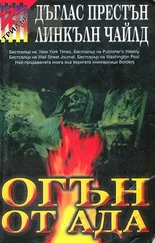“No idea.”
“A person?” Delaplane tried to keep the impatience out of her voice.
“Not a person. A presence ...”
“An animal?”
“I can’t begin... to describe it.” He put his face in his hands.
Delaplane turned to the wife. “Mrs. Ingersoll, did you see anybody?”
She shook her head wordlessly, trying to stifle a sob.
“Is it possible the body fell from above?”
More mute headshaking of uncertainty.
Neither was much help — at least not now. “Thank you,” Delaplane told them. “We’ll need to interview you tomorrow in more detail, so please don’t go anywhere.” She gave them her card. “Get some rest. Officer Rudd will see you back to your hotel.”
She gestured to Sheldrake and they stepped to one side.
“Got an ID from the wallet,” Sheldrake said. “Name’s Brock Custis, nineteen, college student, Auburn University. He was out drinking, which means there were others with him. We need to find them.”
“Christ, why don’t they go to Jacksonville and puke on the beaches like everyone else?”
Delaplane saw a shadowy figure at the edge of the crime scene. The black suit he wore made him looked disembodied, just a ghostly head and hands. There was someone else with him. They were standing back, motionless.
“Don’t look now,” she said, “but it’s Gomez Addams and his sidekick.”
The CSI team was now placing numbers on the sidewalk, marking where evidence was being collected. Delaplane watched for a moment, then turned back to Sheldrake. “I want to interview everyone, everyone , connected with this. The Ingersolls, any people the kid was drinking with, the bartender who served them drinks.” She pointed up to the house and the person at the window. “And that person. Eleven AM sharp in the precinct house. Think you can pull that together for me?”
“I believe so, Commander.”
She thought for a moment. “Invite the feds. I don’t want any ex post facto whining.”
“Will do.”
And with another glance in the direction of the spectral FBI agent — who was now pointing at a large white Victorian house across Whitefield Square and telling his partner, of all things, about an excellent wine tasting he’d once enjoyed there — she left the scene, shaking her head.
Constance — confronted by this dark menace looming over her so abruptly — leapt back a step, instinctively drawing the antique stiletto she was never without, in the paranza corta stance of Italian knife fighting she’d studied. But then she realized that what confronted her was, instead of a giant, the silhouette of an old woman, her shadow magnified by the dim light thrown by a Tiffany lamp, a walking cane in one hand and a pistol in the other. The woman took a step back, the lamp throwing her shadow crazily across the pressed-tin ceiling.
For a moment, the two looked at each other. Then the old woman spoke.
“Well,” she said in a cross voice, “either stab me or put it away.”
“You would seem to have the upper hand of the situation,” Constance replied.
“This?” And the woman turned the weapon sideways, its salt-blued barrel winking at the movement. “It’s not loaded.”
When Constance remained motionless, the older woman sighed, raised the slide toggle, ejected the magazine, and — most unexpectedly — tossed it casually at Constance. She caught it with her left hand and saw that it, indeed, held no rounds. She straightened up, putting her knife away and placing the magazine on a nearby console table. Now she had a chance to see the woman more clearly. She was dressed in an elegant, silk-edged yukata dressing gown, and she was staring at Constance with a look somewhere between annoyance and amusement.
“Part of my collection,” the woman explained.
“Of deadly weapons?”
“Of industrial design. I find great beauty in the marriage of form and function. Others collect paintings; I collect fountain pens, percolators, antique cipher machines— and weapons. Too many, in fact, to display.” She came forward, retrieved the empty magazine, slipped it back into the handle, and snapped the slide back into position. “This model,” she said, holding it up for Constance to admire, “was known as the ‘Black Widow,’ and despite its cheap Bakelite grips I think it’s the most attractive of all the Parabellums.”
She moved over to a sideboard — picking up a battered paperback as she did so — and placed the pistol upon it. As she walked, Constance noted that she appeared to be moving with a degree of pain that could not be concealed. Beyond the woman, Constance could see a series of adjoining rooms, sumptuously furnished, with recessed bookshelves, old tapestries, elaborate rosewood wainscoting, and crown molding. Here and there, folding byōbu screens of latticed rice paper were spread open, their elaborate shoji patterns acting as partitions between sections of the apartment. Along one wall of all the rooms ran a gallery of windows, stretching nearly from floor to ceiling; beyond was a balcony, barely visible in the gloom.
The woman turned back. “You must be Constance Greene,” she said.
Constance, surprised, said nothing.
“You’re staying in the Juliette Gordon Low suite with that FBI agent who’s causing such a stir.” The woman looked quizzically at Constance. “What — did you think that just because I’m ancient and enfeebled, I wouldn’t know what’s going on in my hotel?”
After a moment, Constance replied: “At this point, I think the conventional response would be: ‘I believe you have me at a disadvantage, ma’am.’”
The woman laughed, coming forward again. Although there were sofas and wing chairs arranged around the room immediately behind her, she did not offer Constance a seat. “And I imagine he’s sent you up here to find out, with your feminine wiles, what I know about the recent unpleasantness.”
Constance shook her head. “I was merely curious. I’m not here because of Mr. Ellerby.”
She’d mentioned the name intentionally, and she noticed that, upon hearing it, the old woman could not conceal a wince of sorrow. “I’m here because the rumors I heard have intrigued me.”
“Which rumors are those? There are so many. That I ride out of here at midnight on a broomstick? That I drink the blood of firstborn children? That I’m a direct descendant of Gilles de Rais?”
“No. That, like me, you prefer the company of fine books to that of other people.”
The old woman raised her eyebrows. “Indeed! An interesting habit in one so young. I give you credit for your courage in tiptoeing up here. No doubt you heard all the fearful rumors about me as well.” She paused. “And ἀργαλέος γὰρ Ὀλύμπιος ἀντιφέρεσθαι.”
Constance smiled mirthlessly. “If I am courageous, it’s due in large part to something we both share. συμφερτὴ δ' ἀρετὴ πέλει ἀνδρῶν καὶ μάλα λυγρῶν.”
For the first time, Miss Frost’s eyes registered surprise. “Forgive me,” she said after a moment. “ Regina, iubes renovare dolorem .”
“ Quisque suos patimur Manes ,” Constance quoted in reply.
This was followed by a long silence. “If you know as much about sorrow as you know about dead languages,” Miss Frost said, “then you know it is best kept private.”
“The sorrow, yes,” Constance said. “But not necessarily the sufferer.”
“An interesting coil on sorrow, that.” Miss Frost went silent for a long moment. Then her gaze, which had gone distant, fixed again on Constance. “I’m so sorry I can’t offer you my hospitality,” she said. “But I find myself rather busy this evening.”
Читать дальше
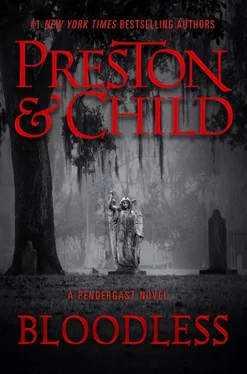


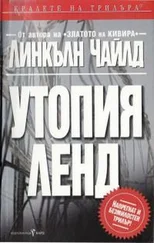
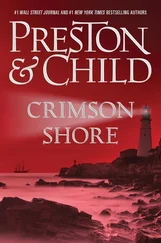
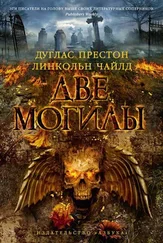

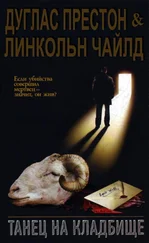

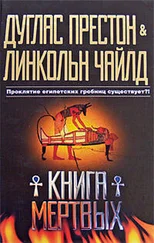
![Линкольн Чайлд - Стихи для мертвецов [litres]](/books/396536/linkoln-chajld-stihi-dlya-mertvecov-litres-thumb.webp)
